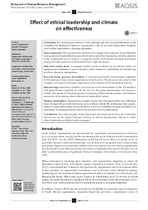Effect of ethical leadership and climate on effectiveness
Date
2017Author
Engelbrecht, Amos S.
Wolmarans, Janneke
Mahembe, Bright
Metadata
Show full item recordAbstract
ORIENTATION: The increasing prevalence of theft, sabotage and other deviant behaviours in the
workplace has disastrous effects for organisations, such as lowered effectiveness, escalated
costs and the organisation’s declining reputation.
RESEARCH PURPOSE: The purpose of the research was to design and investigate the relationships
among perceived leader effectiveness, ethical climate and ethical leadership. A further objective
of the investigation was to validate a conceptual model clarifying the structural associations
among the latent constructs in the South African corporate domain.
MOTIVATION FOR THE STUDY: A successful leader is both an ethical and an effective leader. An
organisation’s leadership is seen as the most critical element in establishing and maintaining
an ethical climate in organisations.
RESEARCH DESIGN, APPROACH AND METHOD: A convenient and multi-cultural sample comprised
of 224 employees from various organisations in South Africa. The structure and content of the
variables were analysed through confirmatory factor analysis (CFA), beside item analysis.
MAIN FINDINGS: Satisfactory reliability was found for all the measurement scales. The results of
CFA demonstrated acceptable fit with the data for the refined measurement and structural
models. The results of structural equation modelling (SEM) indicated positive relationships
among ethical leadership, ethical climate and leader effectiveness.
PRACTICAL IMPLICATIONS: Organisational leaders should take full responsibility for cultivating
ethics through ethical leader behaviour and an ethical climate. By reinforcing these aspects,
perceived leader effectiveness can be advanced, which will ultimately decrease corruption and
other forms of counterproductive behaviour in South African organisations.
CONTRIBUTION: The study provides further theoretical and empirical evidence that leadership
effectiveness can be realised through instilling an ethical organisational climate in which
ethical leadership is exhibited and encouraged.

